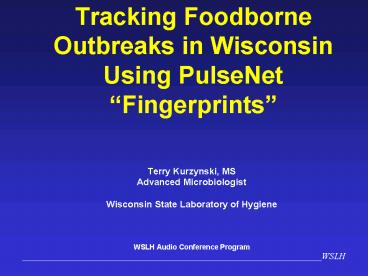Tracking Foodborne Outbreaks in Wisconsin Using PulseNet Fingerprints - PowerPoint PPT Presentation
1 / 44
Title:
Tracking Foodborne Outbreaks in Wisconsin Using PulseNet Fingerprints
Description:
... pepper, salad greens, spinach, strawberries, tomato, watermelon ... been uploaded to the PulseNet National E. coli Database within the past 60 days. ... – PowerPoint PPT presentation
Number of Views:27
Avg rating:3.0/5.0
Title: Tracking Foodborne Outbreaks in Wisconsin Using PulseNet Fingerprints
1
Tracking Foodborne Outbreaks in Wisconsin Using
PulseNet Fingerprints
- Terry Kurzynski, MS
- Advanced Microbiologist
- Wisconsin State Laboratory of Hygiene
- WSLH Audio Conference Program
2
The Public Health Burden of Foodborne Disease in
the US
- Mead et al 1999 - Emerg Infect Dis 1999 5
- 76 million cases per year
- 325,000 hospitalizations
- 5000 deaths
- Cost 8-10 billion/year
- Known pathogens - 14 million (19)
- Unknown pathogens - 62 million (81)
3
(No Transcript)
4
(No Transcript)
5
(No Transcript)
6
Trends in Foodborne DiseasePercent of Food
Spending by Site
Food Review 1623-7, 1993
7
(No Transcript)
8
(No Transcript)
9
(No Transcript)
10
(No Transcript)
11
Examples of Fresh Produce and Juice which
Bacterial Pathogens Have Been Isolated
12
(No Transcript)
13
PFGE Method
Step
- Liquid suspension of bacteria
- Encase in agarose plug
- Lyse with detergent and protease
- Wash away detergent and protease
- Digest with restriction enzyme
- Separate restriction fragments of genome DNA on
PFGE apparatus
Comment
Protects structure of genome DNA Destroys cell
membrane and protein Allows restriction enzyme
to work properly Digests genome and plasmids
into 15-20 fragments Size range 20 800
kilobases
14
Plug Mold
15
Specimen Slice
Comb
Gel
Casting Stand
16
Pump
CHEF Mapper
Cooler
Electrophoresis Chamber
17
(No Transcript)
18
(No Transcript)
19
(No Transcript)
20
Gel Doc Imaging System
21
PFGE Analysis of E.coli O157H7 isolates
M Milwaukee outbreak O Other outbreak ?
marker/internal reference
M
M
M
M
O
O
O
?
?
?
22
(No Transcript)
23
(No Transcript)
24
Pre-Normalization
Post-Normalization
25
(No Transcript)
26
(No Transcript)
27
(No Transcript)
28
(No Transcript)
29
(No Transcript)
30
What is PulseNet?
- A national network of public health laboratories
- State health departments
- Local health departments
- Federal agencies (CDC, USDA, FDA)
- Perform standardized molecular typing of
foodborne disease-causing bacteria by PFGE - Sharing DNA fingerprints electronically
- Enhancing foodborne disease surveillance
31
PulseNet Enhances Surveillance
- Detecting outbreaks by identifying cases with
indistinguishable PFGE patterns - Linking apparently unrelated outbreaks
- Speeding outbreak investigations through focusing
efforts on cases with indistinguishable PFGE
patterns - Monitoring for illnesses associated with a
product retail samples, recalls
32
(No Transcript)
33
(No Transcript)
34
(No Transcript)
35
single food supplier
outbreak in New York
outbreak in California
outbreak in Wisconsin
same PFGE pattern
-Hypothesis for disease transmission -Test food
samples with PFGE
36
(No Transcript)
37
PulseNet WebBoard E. coli Conference
- Example 2002 WI Outbreak
- August 2002
- cluster among campers in WI
- 7 of 20 campers ill 3 confirmed E. coli O157H7
infection - 5 response postings within 1 day
- September 2002
- a second cluster appears in WI
- 25 response postings within 30 days
38
E. coli Cluster Analysis
- Cluster analysis compares isolates that have been
uploaded to the PulseNet National E. coli
Database within the past 60 days.
Isolates from WI cluster 1
39
Comparing Isolates in the E. coli National
Database
- Are there any recent indistinguishable patterns
submitted by USDA or FDA? - Ground beef isolates received from USDA were
indistinguishable from the outbreak pattern by
two enzymes
Patient isolate
Food isolate
WI cluster 2 primary enzyme (XbaI)
40
2002 WI E. coli Outbreak 2 Clusters
41
Reporting to CDC Epidemiologists and PHLs
- Communication is important
- Example Summary
- The Cluster 2 outbreak was epidemiologically
linked to ground beef products originating from a
production plant in WI. During the time period of
9/13/02 to 10/28/02, eighty-five isolates were
received from WI (45), MN (14), MI (13), NY (7),
PA (2), CO (1) and IA (1). - Outcome Approximately 2.8 million pounds of
ground beef were recalled from the WI production
plant.
42
Incidence of E. coli O157 infections, by state,
1999-2002
Isolates /100,000 pop/year
3.0 6.2 1.7 2.9 0.9 1.6 0.2 0.8
43
Other Bacteria Tested By PFGE at the WSLH
- Neisseria meningitidis
- Bordetella pertussis
- Staphylococcus aureus (MRSA)
- Legionella pneumophila
44
Acknowledgements
- I wish to thank the following people for their
assistance in preparation of my slides Dominic
Vacca, Dave Warshauer, Bill Kurth and Kim Kreiger.































